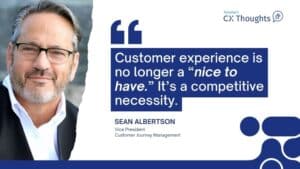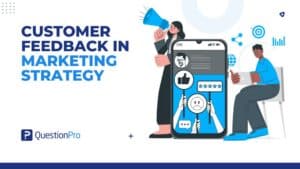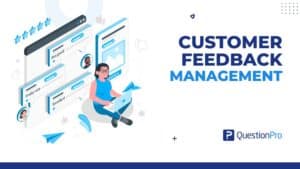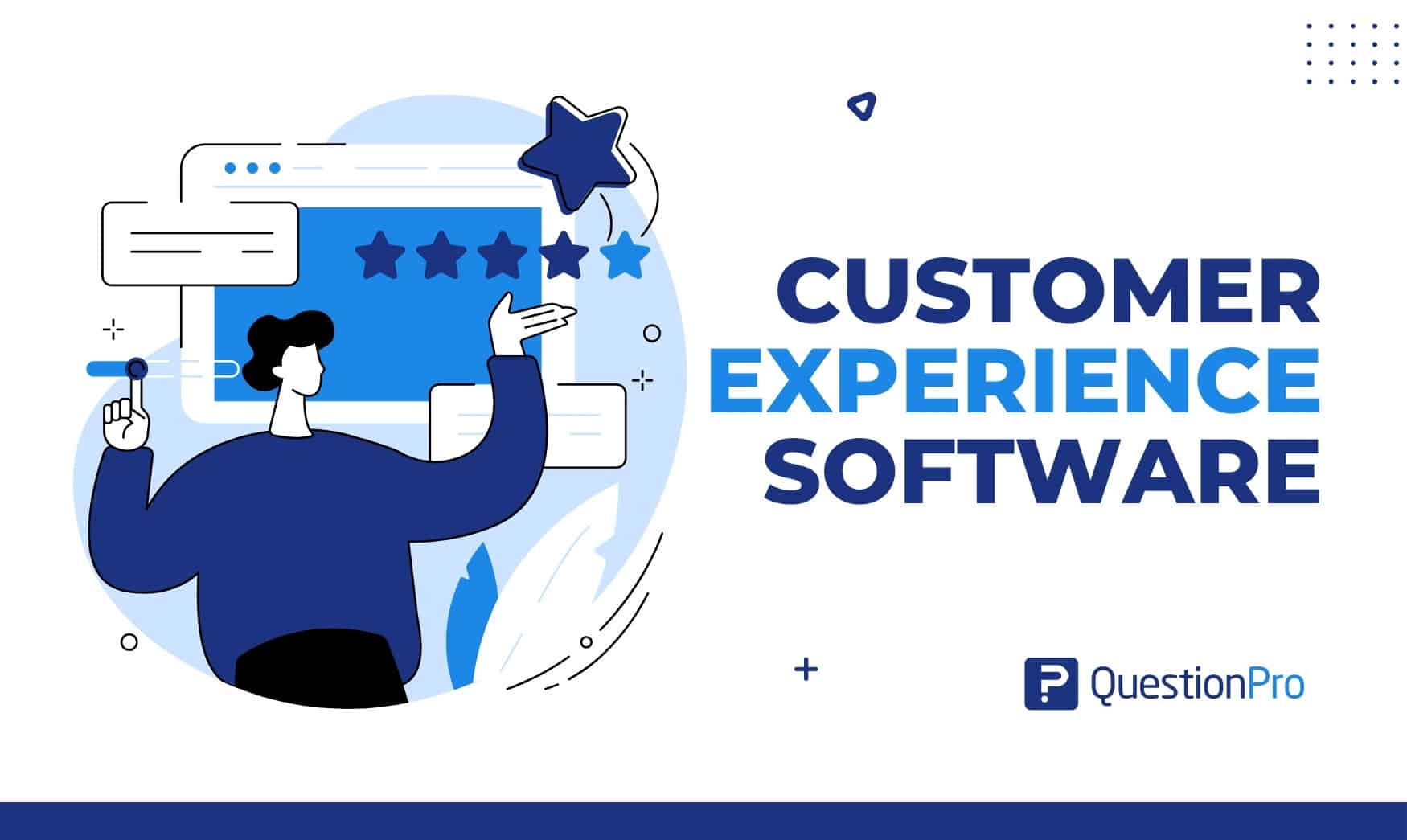
Customer experience (CX) software has become essential for businesses, providing them with the tools to understand, manage, and enhance every aspect of their customer interactions.
This software integrates data analytics, communication platforms, and automation tools to create personalized experiences that align with customer preferences and expectations.
Advanced analytics help CX software examine customer behavior, preferences, and sentiments at various touchpoints. By transforming data into actionable insights, businesses can fine-tune their strategies, anticipate customer needs, solve problems early, and build solid and lasting relationships.
What is Customer Experience?
Customer experience (CX) refers to customers’ perceptions and feelings about their interactions with a company or brand throughout the entire customer journey. It encompasses every customer touchpoint and interaction a customer has with a business, including pre-purchase, purchase, and post-purchase experiences.
Customer experience is shaped by a combination of factors, including the quality of services or products, the ease of use of digital platforms, the effectiveness of customer support, and the overall brand reputation.
Positive customer experience:
- Customer satisfaction, feeling valued and appreciated.
- Personalized interactions.
- Seamless transactions.
- Timely issue resolution.
- Consistent communication across channels.
Negative customer experience:
- Long wait times.
- Poor product quality.
- Confusing website navigation.
- Unresponsive customer service.
What is Customer Experience Software?
Customer experience (CX) software refers to a category of technology solutions designed to help businesses manage, analyze, and enhance every aspect of their customer interactions throughout the customer journey. At its core, CX Software integrates various tools and functionalities to enable organizations to understand, measure, and improve the overall experience delivered to their customers across multiple touchpoints, channels, and interactions.
CX Software is a central platform that aggregates data from diverse sources, including:
- Customer feedbacks.
- Customer interactions.
- Customer transactions.
- Customer behavior patterns.
By harnessing advanced analytics and artificial intelligence capabilities, CX Software enables businesses to gain actionable insights into customer preferences, needs, and sentiments.
Moreover, CX Software often encompasses features for managing and optimizing customer communication channels, such as email, social media, live chat, and voice interactions. It allows businesses to deliver personalized and consistent experiences across these channels, fostering customer engagement, satisfaction, and loyalty.
Importance of Customer Experience Software
Customer experience (CX) software is a game-changer in today’s business landscape. It offers many advantages that can significantly enhance your business’s performance and growth.
Let’s talk about these compelling reasons:
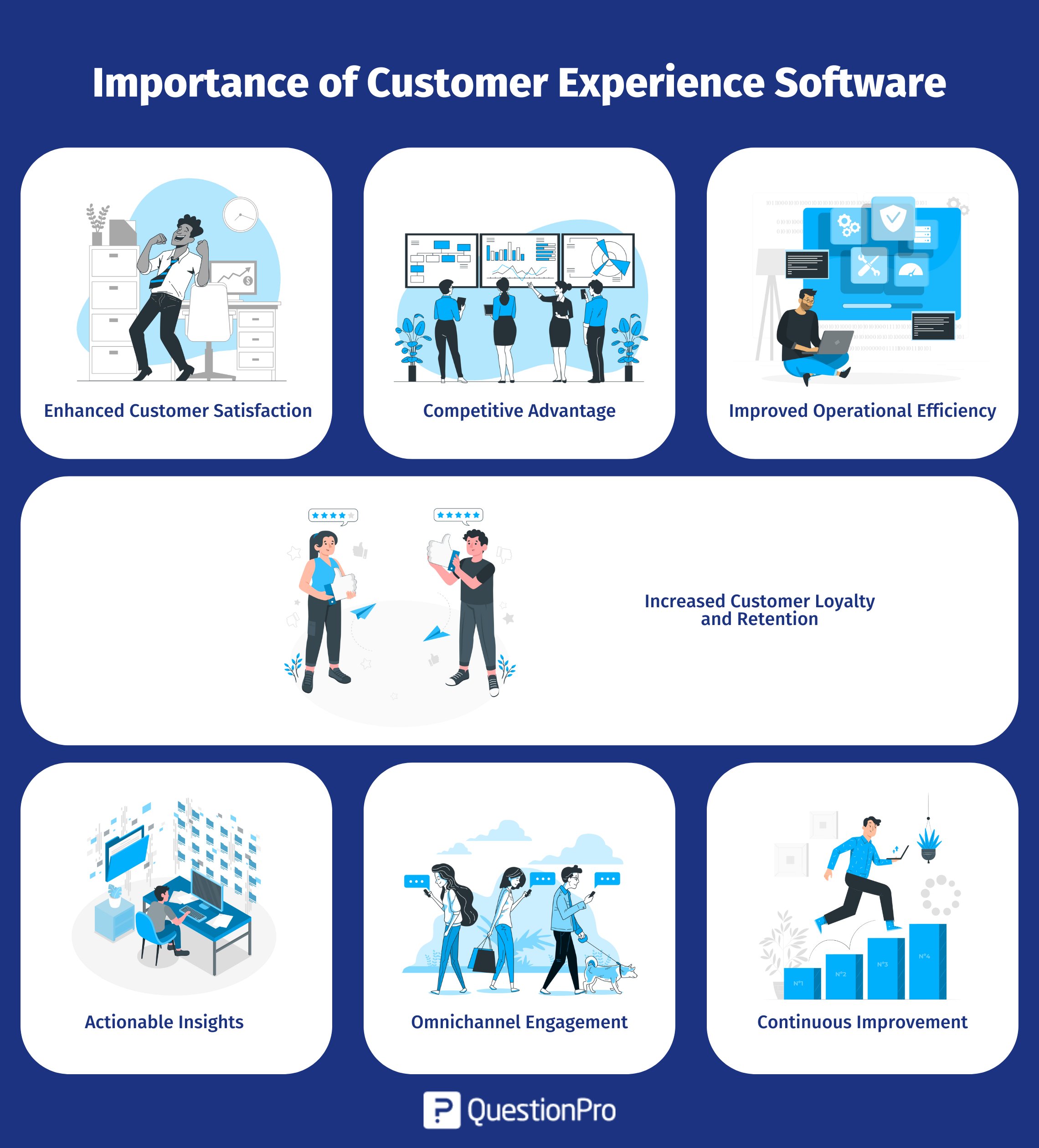
1. Enhanced Customer Satisfaction
CX Software enables businesses to understand customer needs, preferences, and pain points more effectively. By leveraging advanced analytics and feedback mechanisms, organizations can customize their products, services, and interactions to better align with customer expectations, leading to heightened satisfaction.
2. Competitive Advantage
Customer experience is a vital differentiator in today’s fiercely competitive market. Businesses prioritizing and excelling in customer experience often outperform their competitors by attracting and retaining more customers, even in saturated markets.
3. Improved Operational Efficiency
A customer experience solution streamlines and automates various aspects of customer interactions, such as inquiries, support tickets, and feedback management. By optimizing these processes, organizations can reduce operational costs, minimize response times, and allocate resources more efficiently.
4. Increased Customer Loyalty and Retention
To increas customer loyalty and retention:
- CX Software enhances emotional connections with customers through personalized and seamless experiences across all touchpoints.
- Satisfied customers are more likely to make repeat purchases and endorse the brand.
- Strengthened customer loyalty plays a crucial role in promoting sustained revenue growth over the long term.
5. Actionable Insights
The customer experience platform provides businesses:
- Customer data and feedback.
- Valuable insights for businesses.
- Insights help pinpoint areas for enhancement.
- Businesses can make informed decisions based on these insights.
- Services and products can be refined to better align with customer preferences and needs.
6. Omnichannel Engagement
With the proliferation of communication channels, including social media, email, chat, and voice, CX Software facilitates seamless omnichannel engagement. It ensures that customers receive consistent and personalized experiences regardless of their platform or device, thereby strengthening brand perception and loyalty.
7. Continuous Improvement
CX Software facilitates ongoing monitoring, measurement, and optimization of customer experiences. By tracking key performance indicators (KPIs) and customer feedback in real time, businesses can identify areas of strength and weakness, iterate on strategies, and continuously improve the overall customer experience.
Customer experience software empowers businesses to cultivate meaningful customer relationships, drive to increase customer loyalty and advocacy, and achieve sustainable customer success and growth in the competitive marketplace.
Tips for Using Customer Experience Software for Better Customer Feedback
Using Customer experience (CX) software effectively can significantly enhance the quality and utility of customer feedback throughout the entire customer lifecycle. Here are some tips for leveraging CX Software to gather better customer feedback:
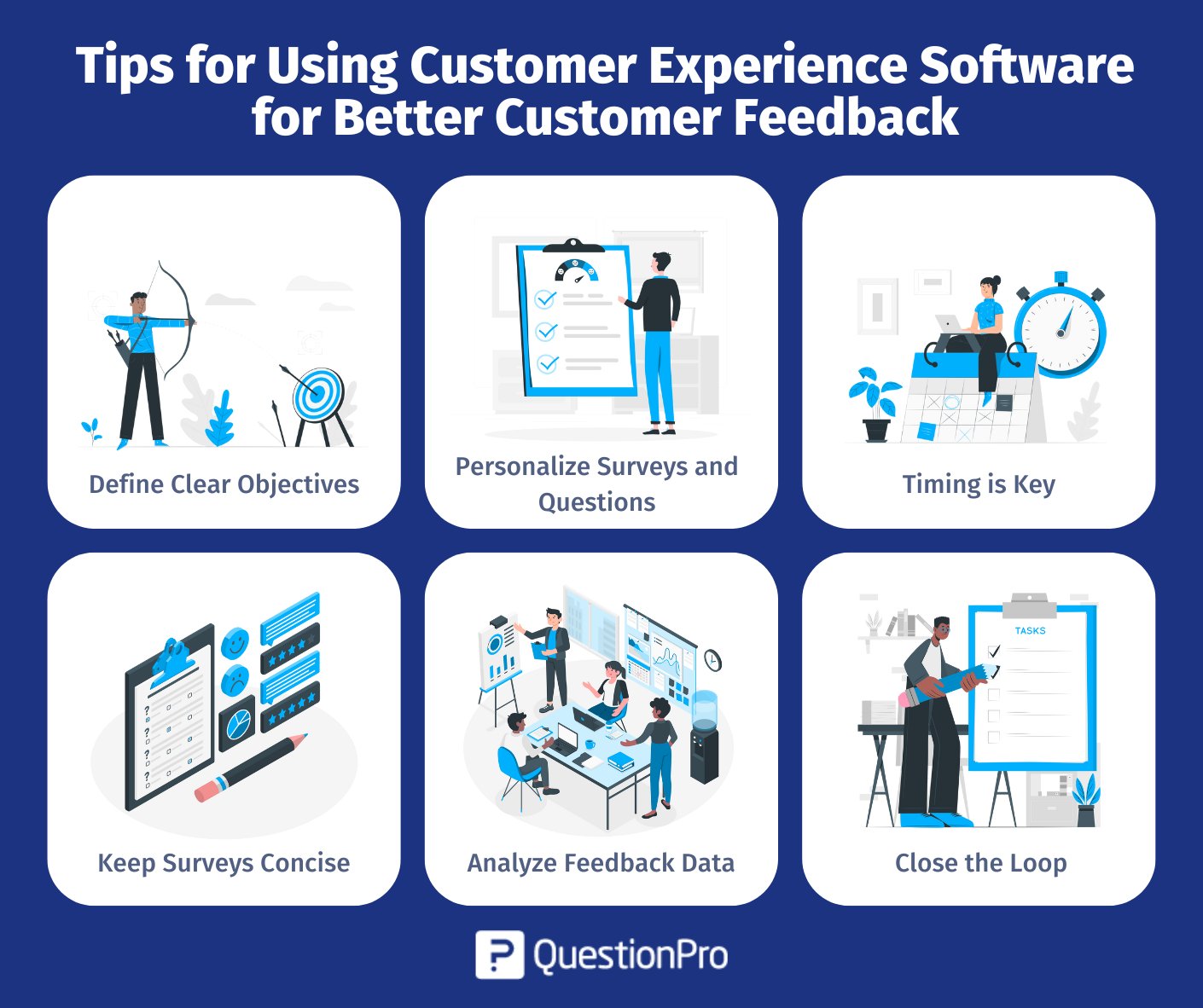
1. Define Clear Objectives
For deploying CX Software to gather customer feedback across various touchpoints in the customer lifecycle:
- Clearly define objectives for gathering customer feedback.
- Determine insights to gain from customer feedback.
- Enhance the customer service platform based on feedback.
- Analyze input for product development purposes.
- Manage online reputation effectively using gathered insights.
2. Personalize Surveys and Questions
Utilize the customization features of your CX Software to create personalized surveys and questions customized to each stage of the customer journey. This approach increases the relevance of the feedback you receive and encourages higher response rates, whether for customer retention efforts or gathering insights through a customer portal.
3. Timing is Key
Consider the timing of your feedback requests to capture feedback at critical touchpoints in the customer lifecycle. Target moments such as post-purchase, after a support interaction, or following a product experience to gather feedback when it’s most relevant and the experience is still at the top of the customer’s mind.
4. Keep Surveys Concise
Respect your customers’ time by keeping surveys concise and focused, especially when collecting feedback throughout the customer lifecycle. Ask only essential questions to maximize completion rates and minimize survey fatigue, whether for analyzing customer feedback or soliciting input for product improvements.
5. Analyze Feedback Data
To utilize CX Software analytics and reporting for real-time feedback analysis:
- Identify recurring trends and patterns in customer feedback data.
- Focus on areas needing improvement across the customer journey.
- Inform strategic decision-making with actionable insights.
- Prioritize initiatives for enhancing customer retention strategies.
- Refine online reputation management efforts effectively.
6. Close the Loop
Follow up with customers who provide feedback to acknowledge their input and communicate any actions taken. Closing the feedback loop demonstrates responsiveness and fosters customer trust and loyalty, whether addressing concerns raised through a customer service platform or implementing suggestions gathered through a customer portal.
By following these tips and effectively leveraging CX Software’s capabilities, businesses can gather better customer feedback, gain actionable insights, and continuously improve the overall customer experience automation throughout the entire customer lifecycle.
15 Best Customer Experience Software
As businesses increasingly prioritize exceptional customer interactions to foster loyalty and drive revenue growth, the demand for sophisticated Customer Experience (CX) Software has surged. These solutions streamline support processes and harness data-driven insights, shaping memorable experiences across diverse touchpoints.
1. QuestionPro CX
QuestionPro CX offers robust customer experience management solutions, including surveys, feedback collection, and analytics tools. It enables businesses to collect customer feedback and insights into customer sentiment, preferences, and satisfaction levels, facilitating informed decision-making and refinement of customer experience strategies.
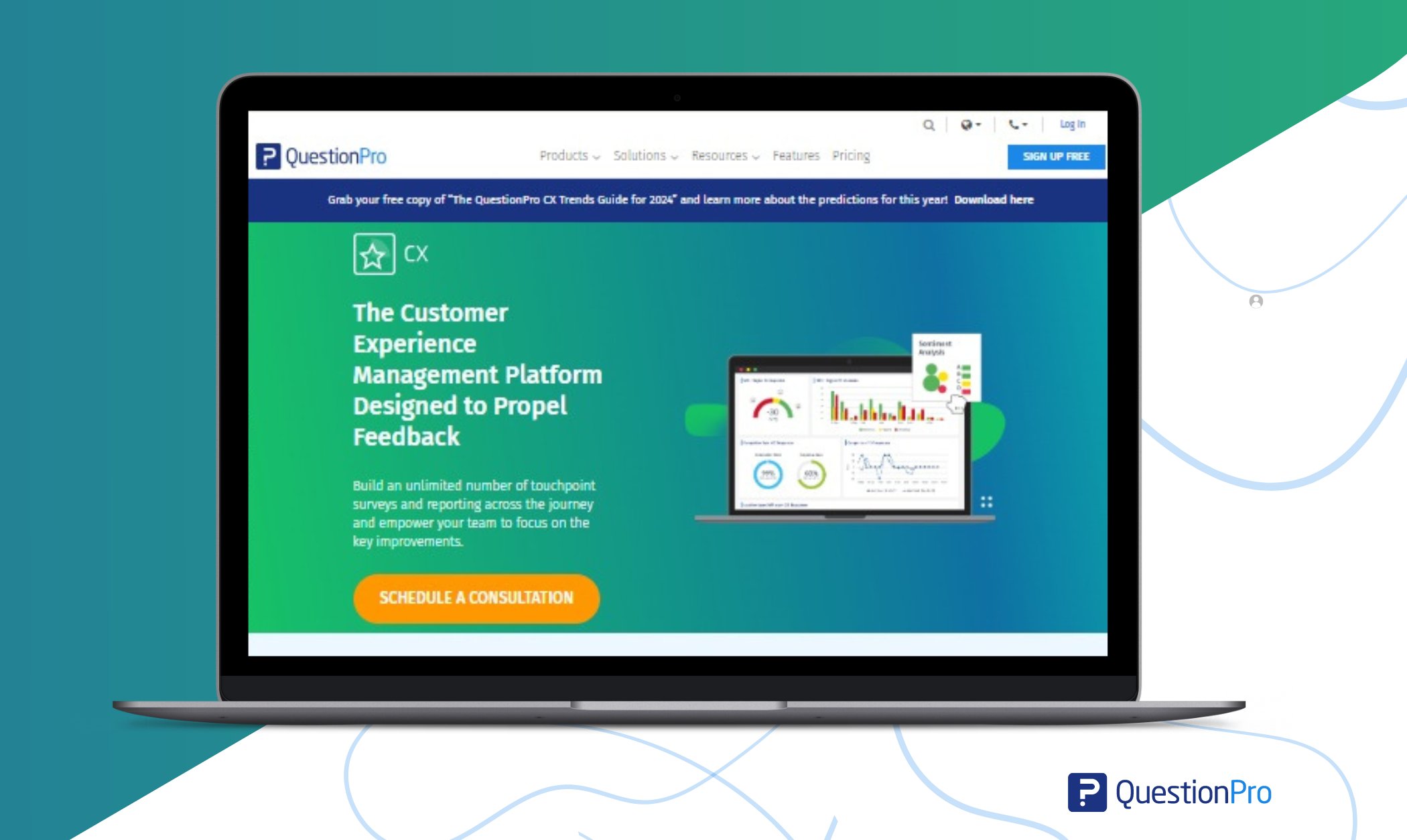
Features:
- Comprehensive survey creation and management tools.
- Advanced analytics for deep insights into customer feedback.
- Automated feedback collection across multiple channels.
- Real-time reporting and customizable dashboards.
- Integration capabilities with CRM systems.
- AI-driven sentiment analysis for understanding customer emotions.
Limitation:
- Advanced features require more effort and resources to be effectively used.
Pricing: The most popular plans start at $99 per month, and Team addition starts at $83. Pricing tiers are available for businesses of all sizes, and custom pricing options are available for enterprise feedback solutions with specific needs.
2. Freshdesk
Freshdesk is a cloud-based helpdesk software that enables businesses to manage customer inquiries, support tickets, and service requests from a centralized platform. It offers ticketing, knowledge base management, and automation to streamline customer support processes.
Features:
- Omnichannel support for unified customer communication.
- Ticketing system with automated routing and prioritization.
- Knowledge management software and a self-service portal for customer assistance.
- Collaboration tools for internal communication and resolution.
- AI-powered chatbots for instant support.
- Reporting and analytics dashboard for performance tracking.
Limitations:
- Advanced reporting capabilities are restricted to higher-priced plans.
- Some users find the interface cluttered and less intuitive compared to competitors.
- Customization options for workflows and automation may be limited for some users.
Pricing: Freshdesk has both a free trial and a free plan. The pro plan costs 49 euros per month with a yearly payment.
3. Qualtrics
Renowned for its powerful customer experience management platform, Qualtrics empowers organizations to capture, analyze, and act on customer feedback across various touchpoints. It provides advanced survey capabilities, sentiment analysis, and predictive analytics to drive continuous improvement in customer experiences.
We recommend reading: Best Qualtrics Alternatives
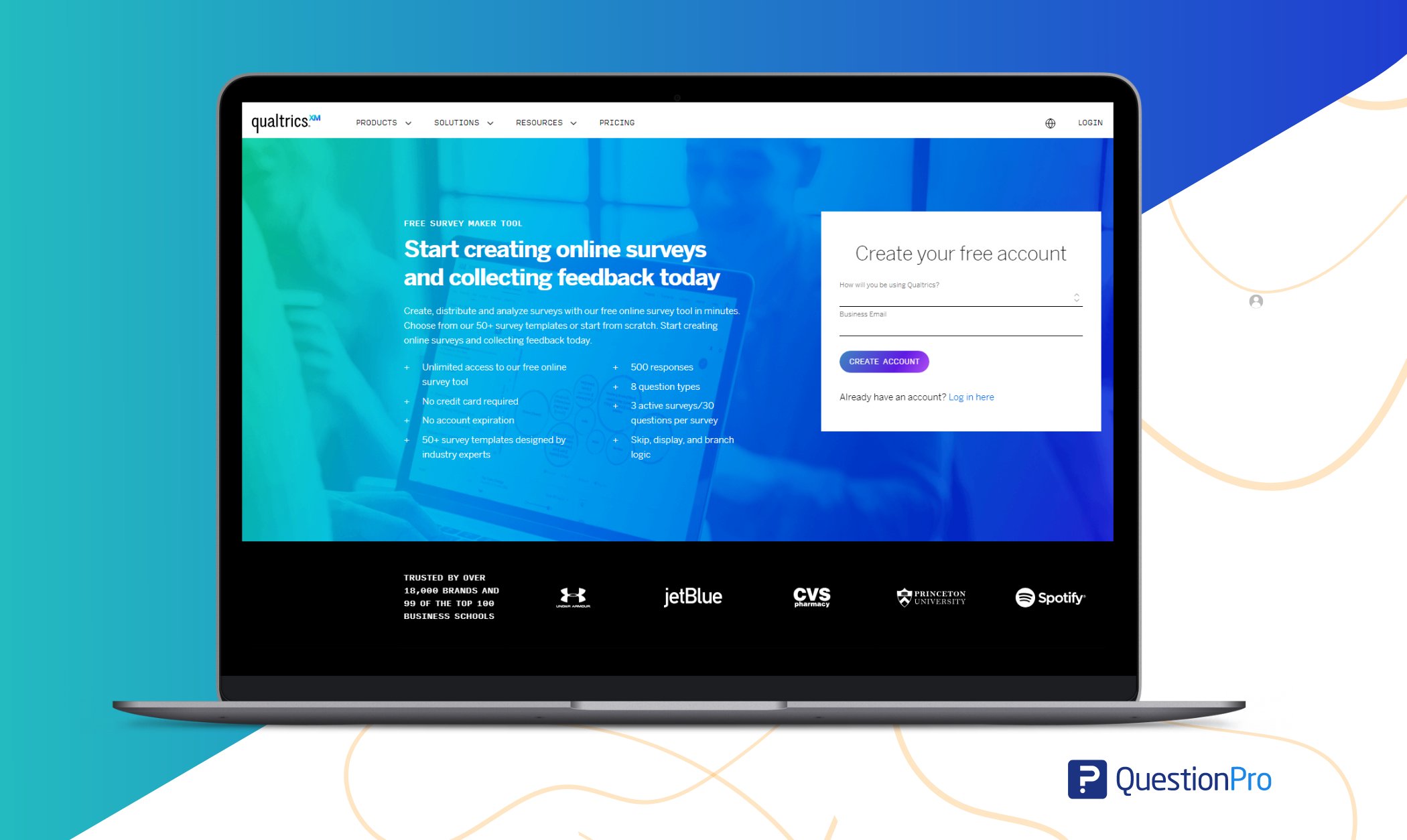
Features:
- Versatile survey and feedback collection functionalities.
- Strong analytics and reporting tools for actionable insights.
- Journey mapping to visualize and optimize customer experiences.
- Advanced text analytics for sentiment analysis.
- Integration with CRM and other business systems.
- Collaboration features for cross-functional teams.
Limitations:
- High pricing tiers may be prohibitive for small to medium-sized businesses.
- Requires significant training and expertise to utilize advanced features effectively.
- Some users report occasional glitches or inconsistencies in survey reporting and analytics.
Pricing: Provides custom pricing based on the needs and scale of the organization.
4. Birdeye
Birdeye provides reputation management and customer experience solutions that help businesses monitor online reviews, collect feedback, and enhance brand perception. Its platform enables organizations to engage with customers, manage their online reputation, and drive customer advocacy.
Features:
- Reputation management tools for monitoring and managing online reviews.
- Customer surveys and feedback collection across multiple channels.
- AI-driven insights for sentiment analysis and trend identification.
- Social media monitoring and engagement features.
- Integration with CRM systems for unified customer data.
- Reporting and analytics dashboard for performance tracking.
Limitations:
- Pricing may be higher compared to some other CX solutions.
- Advanced customization options may require technical expertise to implement.
- Integration capabilities with specific CRM systems may be limited.
Pricing: Standard Plan: $299 per month for listings.
5. Zendesk
Zendesk is a leading customer service software suite that offers omnichannel support, ticketing systems, and self-service options. It helps businesses streamline customer interactions, resolve inquiries efficiently, and deliver personalized support experiences across email, chat, phone, and social media channels.

Features:
- Multichannel support for seamless customer interactions.
- Ticketing system for efficient issue resolution.
- Knowledge base for self-service customer support.
- Automation and workflow management capabilities.
- Analytics and reporting to track support metrics.
- Customizable dashboards and reporting.
Limitations:
- Advanced reporting and analytics features are available only in higher-priced plans.
- Integration with certain third-party apps and platforms may require additional development resources.
- Customer support response times can be variable, particularly during peak periods.
Pricing: Zendesk offers a range of pricing plans starting from $55 per agent per month, with additional features available in higher-tier plans.
6. Oracle
Oracle provides customer experience management solutions that enable businesses to deliver personalized experiences across marketing, sales, and service interactions. Its comprehensive suite of tools includes CRM, marketing automation, and customer service capabilities.
Features:
- A unified CX platform is used to manage customer interactions across channels.
- AI-powered customer service chatbots for instant support.
- Personalization capabilities for delivering customized experiences.
- Journey mapping and analytics for understanding customer behavior.
- Integration with Oracle’s suite of business applications.
- Scalable and customizable solution for businesses of all sizes.
Limitations:
- High initial investment and ongoing costs may be prohibitive for smaller businesses.
- The implementation process may be complex and time-consuming.
- Some users report challenges with customer support responsiveness and issue resolution.
Pricing: Pricing varies depending on the specific applications and services required, with custom pricing available upon request.
7. Medallia
Medallia specializes in customer experience management software, providing comprehensive solutions for capturing feedback, measuring satisfaction, and driving customer-centric decision-making. Its advanced analytics capabilities enable businesses to uncover actionable insights and enhance customer engagement strategies.

Features:
- Experience management platform for capturing feedback across touchpoints.
- AI-driven insights for predictive analytics and trend analysis.
- Action management to prioritize and track improvement initiatives.
- Text analytics for sentiment analysis and feedback categorization.
- Integration with CRM and other business systems.
- Role-based access control for secure data management.
Limitations:
- A complex implementation process may require extensive training and resources.
- Some users find the user interface less intuitive compared to other CX platforms.
- The pricing structure must be more flexible, making it less suitable for smaller businesses.
Pricing: pricing is available upon request.
8. Podium
Podium offers customer interaction management software that facilitates communication between businesses and customers through messaging, reviews, and feedback channels. It helps companies build strong customer relationships and improve their online presence with a customer relationship management platform.
Features:
- Messaging platform for efficient customer communication.
- Review management tools for monitoring and responding to online reviews.
- Webchat and SMS functionalities for instant support.
- Feedback collection through surveys and review requests.
- Integration with CRM systems for seamless data synchronization.
- Reporting and analytics for tracking customer sentiment and engagement.
Limitations:
- Certain features like sentiment analysis may not be as robust as other platforms.
- Some users report challenges with syncing data across different systems.
- It has limited scalability options for larger enterprises with complex requirements.
Pricing: pricing is available upon request.
9. HubSpot
HubSpot offers a suite of CRM and marketing automation tools, including features for managing customer interactions, tracking leads, and analyzing customer behavior. It helps businesses build more vital customer relationship management by delivering personalized communications and seamless experiences.
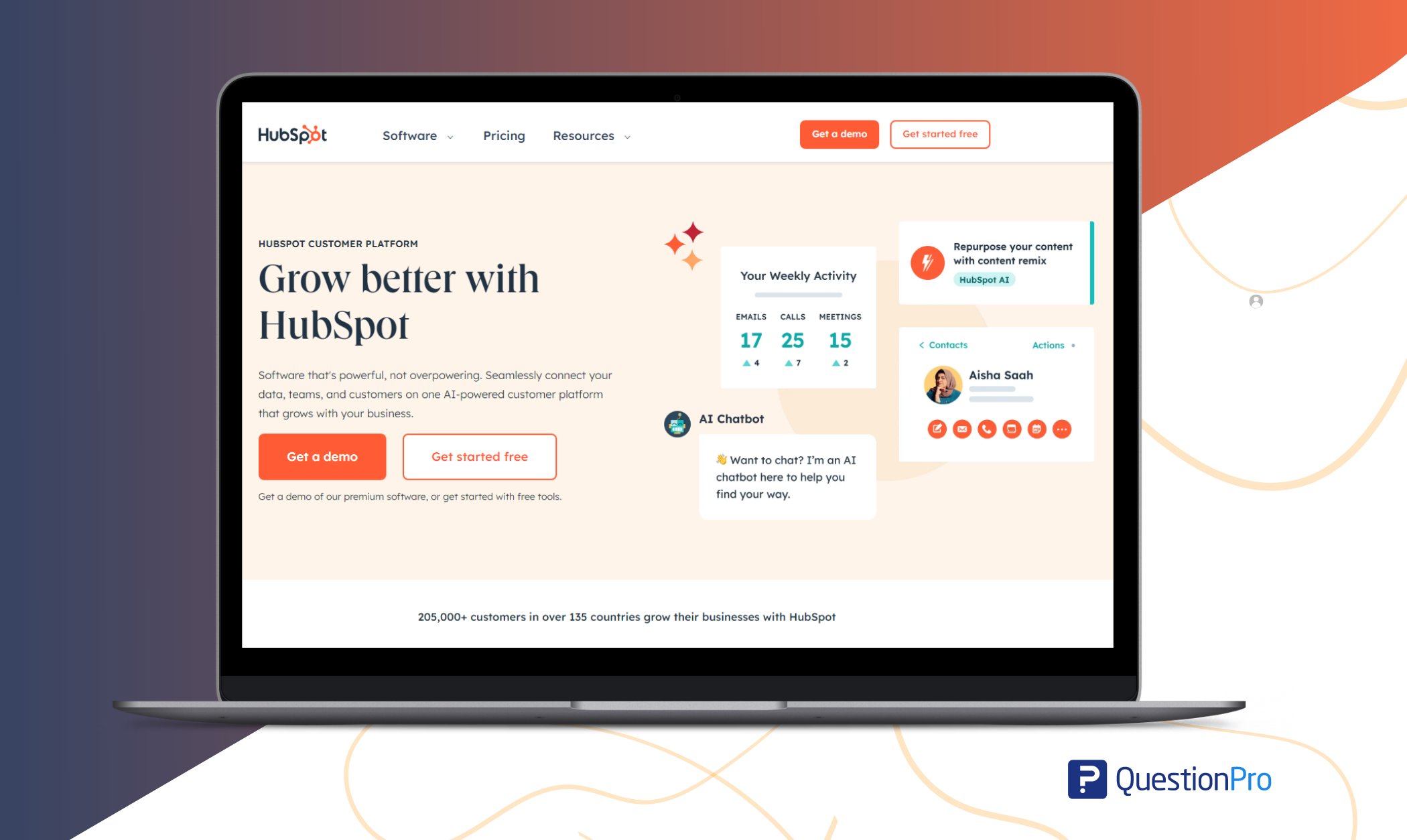
Features:
- All-in-one CRM with integrated customer support features.
- Ticketing system for managing customer inquiries.
- Knowledge base and self-service options.
- Marketing automation for personalized customer interactions.
- Reporting and analytics to track customer engagement.
- Integration with other HubSpot tools and third-party apps.
Limitations:
- Certain advanced features may only be available in higher-priced tiers.
- Integration capabilities with specific third-party applications may be limited.
Pricing: Plans start at $890 per month.
10. Genesys
Genesys offers omnichannel customer experience solutions, including contact center software, workforce optimization, and voice-of-the-customer analytics. It helps businesses deliver seamless and personalized experiences across all customer touchpoints.
Features:
- Omnichannel contact center solution for unified customer communication.
- AI-powered chatbots and virtual assistants for self-service support.
- Predictive analytics for forecasting customer needs and behavior.
- Routing and queuing capabilities for efficient phone call handling.
- Integration with CRM and other business systems.
- Real-time monitoring and reporting for performance optimization.
Limitations:
- High initial setup and implementation costs may be prohibitive for smaller businesses.
- Advanced features may require additional add-ons, increasing overall costs.
- Some users report challenges with the complexity of the platform and require extensive training to utilize it effectively.
Pricing: Offers custom pricing based on each organization’s specific needs and scale. Pricing is available upon request.
11. Zoho Desk
Zoho Desk is customer support software designed to help businesses deliver exceptional customer service experiences. It offers multiple channels support, ticket management, and AI-powered assistance to effectively improve response times and resolve customer issues.
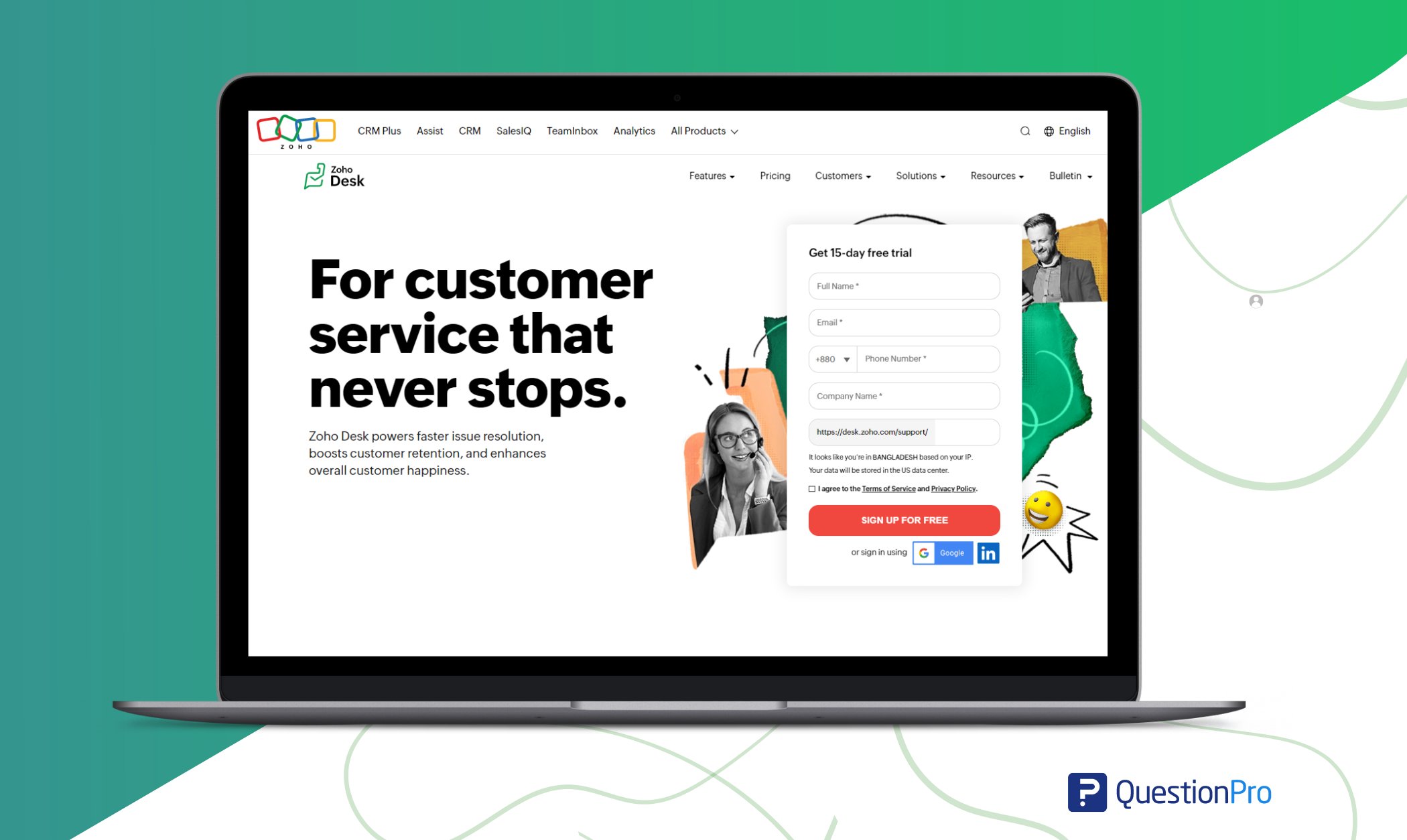
Features:
- Multichannel ticketing system for streamlined customer support.
- Knowledge base for self-service and proactive support.
- AI-powered automation for ticket routing and resolution.
- Collaboration tools for team communication and resolution.
- Customer sentiment analysis for feedback insights.
- Integration with other Zoho applications and third-party tools.
Limitations:
- Advanced features such as AI-powered analytics may require additional add-ons.
- Integration options with third-party applications may be limited compared to other platforms.
- Some users report occasional performance issues during peak usage times.
12. Adobe Experience Manager
Adobe Experience Manager is a complete content management and digital experience platform that helps businesses deliver engaging and personalized experiences across web, mobile, and other digital channels. It empowers organizations to create, manage, and optimize content to drive customer engagement and loyalty.
Features:
- Content management system for creating personalized experiences.
- Digital asset management is used to organize and distribute content.
- Personalization and targeting capabilities for delivering relevant content.
- A/B testing and optimization tools for improving customer experiences.
- Reporting and analytics dashboard for tracking content performance.
Limitations:
- High initial investment and ongoing costs may be prohibitive for smaller businesses.
- A complex implementation process may require extensive training and resources.
- Some users report challenges with the complexity of the platform and require advanced technical expertise to utilize it effectively.
Pricing: pricing is available upon request
Pricing: Price starts at $20 per month for the Standard and $60 per month for the Professional plan.
13. Salesforce
Salesforce is a leading CRM platform that offers a wide range of customer experience solutions, including sales, marketing, service, and commerce tools. It helps businesses build stronger customer relationships, drive engagement, and accelerate revenue growth.
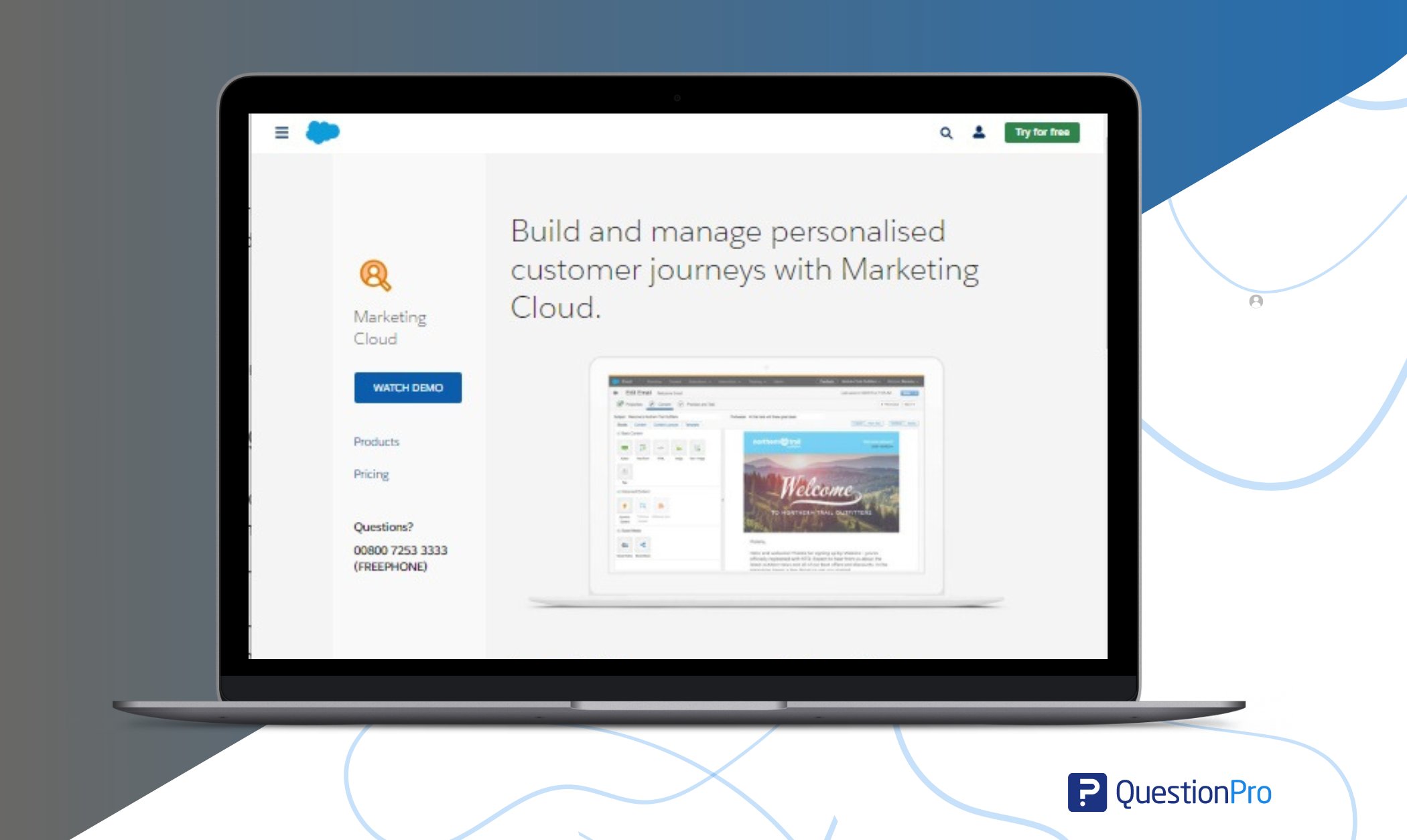
Features:
- Integrated CRM with customer service and support functionalities.
- Case management for tracking customer inquiries and issues.
- A community platform for self-service and peer-to-peer support.
- AI-driven insights for predictive analytics and recommendations.
- Integration with third-party apps and Salesforce AppExchange.
- Reporting and analytics dashboard for monitoring KPIs.
Limitations:
- Customization options may require advanced technical expertise to implement effectively.
- Pricing may be higher than other CX solutions, especially for smaller businesses.
Pricing: pricing is available upon request
14. LiveAgent
LiveAgent is a helpdesk and live chat software solution enabling businesses to provide real-time customer support across multiple channels. It offers ticketing, live chat, and knowledge base management features to enhance customer service experiences.
Features:
- Multichannel ticketing system for managing customer inquiries.
- Live chat and email support for real-time communication.
- Knowledge base and FAQ section for self-service assistance.
- Call center integration for voice support.
- Automation rules for routing and prioritizing tickets.
- Reporting and analytics for performance tracking.
Limitations:
- Integration options with specific third-party applications may be limited.
- Some users report occasional performance issues during peak usage times.
Pricing: Pricing starts at around $9 per user per month for the Basic plan.
15. Acquire
Acquire provides customer communication and engagement software that facilitates live chat, video calls, and co-browsing capabilities. It enables businesses to offer real-time assistance to customers and enhance the overall support experience.
Features:
- Live chat and video chat for real-time customer support.
- Cobrowsing and screen sharing for interactive assistance.
- Chatbots are used to handle routine inquiries and automate responses.
- Integration with CRM systems and helpdesk software.
- Knowledge base and self-service options for customer assistance.
- Reporting and analytics dashboard for tracking chat performance.
Limitations:
- Limited customization options for specific features and templates.
- Integration capabilities with specific CRM systems may be limited.
Pricing: Premium plan starts at $390 per year.
These CX software platforms empower businesses with advanced analytics, omnichannel support, and personalized automation, elevating customer interactions. By prioritizing innovation and customer-centricity, organizations exceed expectations, foster lasting relationships, and drive sustained growth in today’s competitive market.
Comparison Table: 10 Best Customer Experience Software
If you are comparing CX tools side by side, this table gives you a quick snapshot of what each platform focuses on, how it is rated, and how the pricing roughly starts. It is meant to support your main review section, not replace it, so readers can scan and decide which tools deserve a closer look.
| Tools | Key Features | G2 Rating | Pricing |
| QuestionPro CX | CX surveys and feedback, multichannel collection, real time dashboards, advanced analytics, CRM integrations, AI sentiment analysis | 4.5 | Pricing starts at $99 per month |
| Freshdesk | Omnichannel ticketing, automation and routing, knowledge base and self service portal, AI chatbots, collaboration, reporting | 4.4 | Pricing start at $49 per month |
| Qualtrics | Enterprise CX management, flexible surveys, journey mapping, predictive analytics, text and sentiment analytics, CRM integrations | 4.3 | Custom pricing |
| Birdeye | Review and reputation management, customer surveys, social media monitoring, AI sentiment insights, CRM integrations, CX analytics | 4.7 | Pricing starts at $99 per month |
| Zendesk | Omnichannel support, ticketing and workflows, self service knowledge base, automation, analytics and dashboards, app integrations | 4.3 | Pricing starts at $55 per month |
| Oracle Service Cloud | Unified CX platform across channels, knowledge base, self service portal, contact center tools, chat and messaging, strong integrations | 3.9 | Custom pricing |
| Medallia | Experience management across touchpoints, AI insights and predictive analytics, text analytics, action management, role based CX dashboards | 4.5 | Custom pricing |
| Podium | Messaging based CX, reviews and reputation tools, webchat and SMS, lead capture and payments, text marketing, CRM integrations | 4.6 | Custom pricing |
| HubSpot Service Hub | All in one CRM connected help desk, ticketing, knowledge base, automation, customer portals, reporting and customer health insights | 4.4 | Pricing starts at $890 per month |
| Genesys Cloud CX | Omnichannel contact center, voice, chat, email and messaging, AI bots, workforce management, routing and queues, real time analytics | 4.4 | Custom pricing |
Why QuestionPro is The Best CX Software
QuestionPro stands out as one of the best customer experience (CX) software due to several compelling reasons:
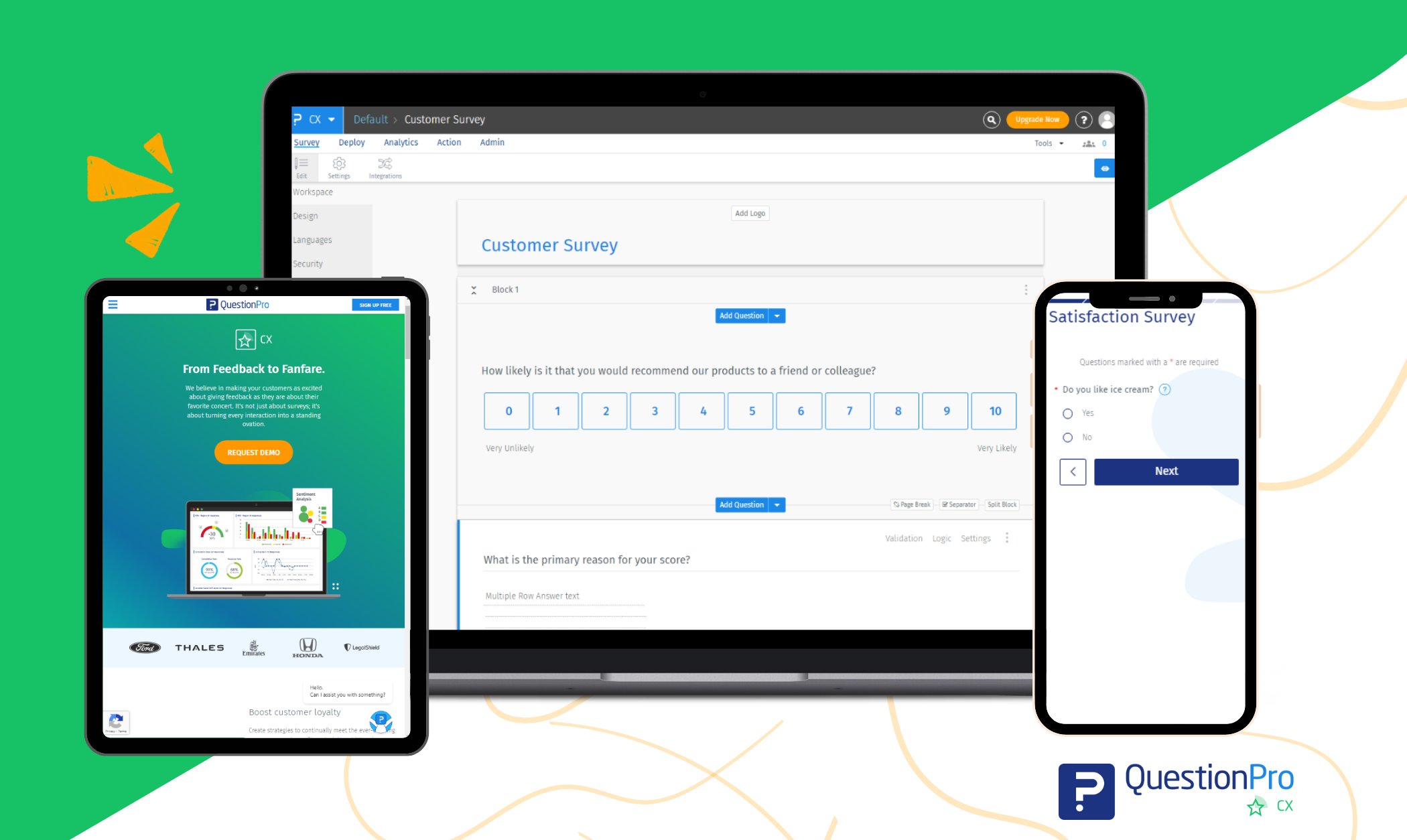
1. Robust Survey Capabilities
QuestionPro offers extensive survey tools and features, allowing businesses to create highly customizable surveys customized to their needs. With options for advanced question types, branching logic, and multimedia integration, QuestionPro empowers organizations to gather comprehensive feedback from customers at every touchpoint.
2. Advanced Analytics
Leverage powerful analytics tools for:
- Actionable customer insights.
- Real-time dashboards for immediate feedback analysis.
- In-depth reporting capabilities for comprehensive insights.
- Identify trends and areas for improvement.
- Make data-driven decisions to enhance customer experience.
3. Ease of Use
QuestionPro balances sophisticated features with a user-friendly interface, ensuring accessibility for users at all proficiency levels. Intuitive survey design tools, customizable templates, and seamless navigation streamline the survey creation process, allowing businesses to launch campaigns quickly and efficiently.
4. Omnichannel Engagement
QuestionPro supports omnichannel engagement, enabling businesses to reach customers through various web, email, SMS, and mobile channels. This versatility ensures that organizations can gather and track customer feedback wherever they are, facilitating a holistic understanding of the customer journeys.
5. Scalability
Whether it’s a small startup or a large enterprise, QuestionPro offers scalable solutions:
- The platform accommodates businesses of any size, from basic surveying needs to complex enterprise requirements.
- It provides flexible pricing plans.
- Features are customizable to suit diverse organizational needs and budgets.
6. Customer Support
QuestionPro is renowned for its exceptional customer support. It offers assistance through various channels, including email, live chat, and phone support. With dedicated customer service teams of experts ready to address issues or concerns, businesses can rely on QuestionPro for prompt and reliable support whenever needed.
QuestionPro’s comprehensive features, intuitive interface, scalability, and stellar customer support make it the preferred choice for businesses seeking to elevate their customer experience initiatives and drive significant progress in customer satisfaction and loyalty.
Conclusion
The importance of customer experience (CX) software in today’s business world is hard to overstate. As companies realize how critical great customer experiences are for success, CX software has become a vital tool for guiding the challenges of the modern market.
By combining advanced analytics, omnichannel engagement, and seamless automation, CX software gives businesses a deep understanding of customer preferences, behaviors, and emotions.
As customer expectations rise, investing in strong CX software is no longer optional. It’s a strategic must for companies dedicated to delivering outstanding experiences and staying competitive in today’s fast-paced marketplace.
Customer Experience (CX) Software refers to a category of technology solutions designed to help businesses manage, analyze, and enhance every aspect of their customer interactions throughout the customer journey.
CX (Customer Experience) and CRM (Customer Relationship Management) are related concepts, but they are different.
CX is about overall experience; CRM is about managing data and relationships.
CX (Customer Experience)
Definition: Overall impression customers have from all interactions with a company.
Focus: Quality and perception of interactions.
Goal: Enhance satisfaction and loyalty.
CXM (Customer Experience Management)
Definition: Strategies and tools used to manage and improve CX.
Focus: Actively managing and optimizing customer interactions.
Goal: Systematically improve customer experience across all touchpoints.




